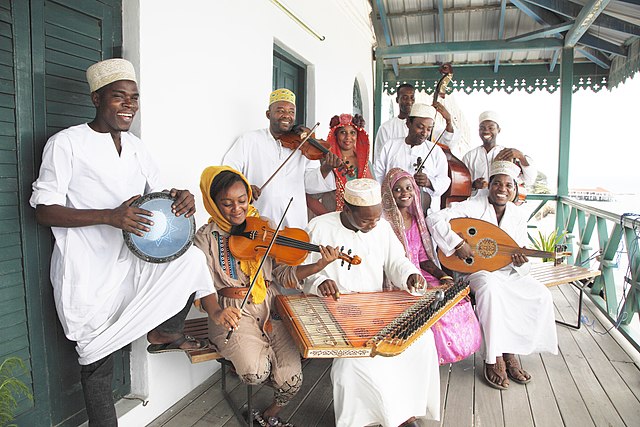Eid al-Fitr in Kenya and Tanzania: A Joyous Celebration of Faith and Community
In this post we’ll learn about Eid al-Fitr in Kenya and Tanzania. This holiday, whose name means “the Festival of Breaking the Fast,” is one of the most significant celebrations in the Islamic calendar. It marks the end of Ramadan, a holy month of saumu (fasting from Arabic ṣawm, صوم), prayer, and reflection. The exact date of Eid depends on the sighting of the crescent moon, so it changes every year. But it usually falls on the first day of Shawwal, the tenth month of the Islamic lunar calendar. That doesn’t correspond neatly to a regular date on the Gregorian calendar. In Kenya and Tanzania, countries with vibrant Muslim communities, Sikukuu ya Eid al-Fitr (Eid al-Fitr) is observed with deep spiritual devotion, communal gatherings, and joyful festivities.
Eid al-Fitr in Kenya
Kenya has a significant Muslim population concentrated along the coastal region, particularly in Mombasa, Lamu, Malindi, and Nairobi’s Eastleigh neighborhood. Kenyan Muslims celebrate Eid al-Fitr with great enthusiasm. The day begins with the special Eid prayer Swala ya Eid (Arabic Ṣalāt al-Eid, صلاة العيد), performed in open fields or mosques. In Mombasa, the Masjid Shibu Mosque and other grand mosques are full of worshippers donning nguo mpya (new clothes) to signify renewal and gratitude.
A unique aspect of Eid in Kenya is the vibrant Swahili culture that blends Islamic traditions with coastal customs. Families prepare traditional Swahili delicacies such as mandazi (fried dough), viazi vya karai (spiced fried potatoes), and mkate wa sinia (coconut rice cake). A special meal known as pilau—a fragrant spiced rice dish with meat—is commonly enjoyed after the morning prayers.
Eid al-Fitr is also a time of and zaka (charity, from Arabic zakāt al-fitr زكاة الفطر), where Muslims ensure that the less fortunate can partake in the celebrations. The coastal communities of Kenya have a unique tradition where processions of children go from house to house, singing maulidi (Islamic praise songs), and receiving small gifts or money. This custom, locally called kuomba msamaha (seeking forgiveness), emphasizes reconciliation and community bonding.
In major cities like Nairobi, Eid is marked by public gatherings in parks, fun activities for children, and large feasts shared among family and friends. It is also a public holiday, allowing both Muslims and non-Muslims to participate in the festivities.
Eid al-Fitr in Tanzania
Tanzania, particularly Zanzibar and the coastal city of Dar es Salaam, is famous for its grand Eid al-Fitr celebrations. The island of Zanzibar, with its predominantly Muslim population, transforms into a hub of festivity during this time. Like in Kenya, the day begins with the special Eid prayer held in mosques and open grounds, such as the iconic Mnara wa Mbao prayer ground in Stone Town.
One of the most distinguishing aspects of Eid in Tanzania is the extended celebrations, which can last up to three days. Families visit each other, exchanging greetings with “Eid Mubarak” or “Eid njema” in Swahili. A popular phrase during this time is “Kula kwa heshima, sherehe kwa adabu“—which means “Eat with respect, celebrate with decorum.”
Traditional Tanzanian Eid feasts include biriani (a rich, spiced rice dish with meat), sambusa (samosas), and mshikaki (grilled meat skewers). Urojo, a unique Zanzibar soup made with mango, potatoes, and tamarind, is a street favorite during Eid.
Another major highlight in Zanzibar is the Ngoma ya Eid, a vibrant cultural performance featuring traditional Taarab music and Swahili dances. The celebrations spill into the streets, with people attending football matches, dhow races, and beach gatherings, making it a truly communal occasion.
In rural parts of Tanzania, Eid is celebrated with community prayers and shared meals. Many people travel from cities back to their hometowns to celebrate with their extended families. Unlike other Muslim regions where Eid is primarily a private affair, Tanzanians often hold large, inclusive feasts where even non-Muslim neighbors are invited, reflecting the strong sense of ujamaa (community spirit).
Unique Observances in Kenya and Tanzania
While Eid al-Fitr is universally a day of joy, gratitude, and charity, certain customs in Kenya and Tanzania distinguish their celebrations from those in the Middle East or South Asia. One such custom is the maulidi processions in Lamu and Zanzibar, where believers recite Islamic poetry while parading through the streets. This is a blend of African and Islamic traditions.
Another distinctive feature is the fusion of Swahili cuisine with Arab, Indian, and African influences. Unlike in the Gulf, where Eid meals center around lamb and dates, Swahili Eid meals are seafood-rich and include tropical flavors like coconut, tamarind, and mango.
Additionally, in both Kenya and Tanzania, the post-Eid festivities often extend beyond just one day. There are cultural events, sports competitions, and outdoor fairs bringing communities together. The emphasis on public celebrations and extended communal interactions sets the East African Eid experience apart from more reserved observances in some parts of the Muslim world.
Eid al-Fitr in Kenya and Tanzania is more than just a religious event—it is a cultural, social, and spiritual milestone that unites communities in shared joy. The unique blend of Swahili traditions, warm hospitality, and festive spirit makes Eid in East Africa an extraordinary experience.
Eid Mubarak! Heri ya Eid! Eid Njema!
Get on the road to speaking Swahili with the Language Garage!
We hope you’ve enjoyed learning about Eid al-Fitr in Kenya and Tanzania. If you’d like to learn more:
- Follow us on Facebook, LinkedIn, BlueSky, Twitter, Threads, Instagram, or Pinterest. We publish lots of Swahili vocabulary, grammar, and culture notes, so it’s a great way to pick up some new vocabulary and practice.
- Check out our other posts on Swahili language, culture, and more.
- Enroll in affordable, flexible, and personalized private online Swahili lessons or sign up for a small group online Swahili class.
- Create a free Language Garage account to access tons of Swahili vocabulary, grammar, and culture.






